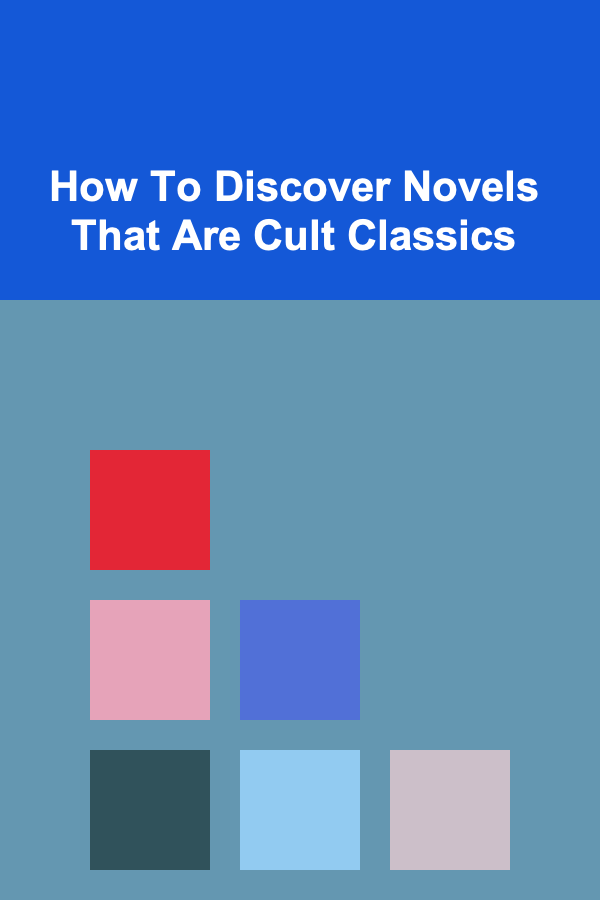
How To Discover Novels That Are Cult Classics
ebook include PDF & Audio bundle (Micro Guide)
$12.99$11.99
Limited Time Offer! Order within the next:

Cult classics are an elusive breed of novels. Often not initially celebrated by mainstream audiences or critics, these works of literature possess a unique charm that allows them to endure and thrive in niche circles over time. The term "cult classic" usually refers to books that have a dedicated fanbase, but have not always been bestsellers or widely acclaimed upon release. These novels stand apart because they provide something deeper, more profound, or uniquely experimental than conventional works. But how does one discover such hidden gems? This article explores the methods, insights, and sources for discovering novels that have the potential to become cult classics, or that may already have earned that status in smaller literary communities.
Understanding What Makes a Cult Classic Novel
Before delving into the discovery process, it's crucial to understand the characteristics that define a cult classic novel. Unlike bestsellers, which are often loved by the masses, cult classics are typically distinguished by a few key features:
- Niche Appeal: Cult classics tend to appeal to a particular subculture or group of readers, often outsiders or those with a particular worldview.
- Underdog Status: Many cult classics were initially overlooked or dismissed by mainstream critics and audiences. Over time, they find their audience and begin to develop a loyal following.
- Timelessness: A cult classic often stands the test of time. These books are not merely of their moment but continue to resonate with readers across generations.
- Innovative or Experimental Writing: Cult classics often push the boundaries of conventional storytelling. They may experiment with narrative techniques, genre blending, or the exploration of taboo subjects.
- Memorability: They usually have unforgettable characters, moments, or themes that leave a lasting impact on readers.
Given these qualities, the next logical step is identifying the methods through which you can find novels that may have the potential to fit this mold.
Leverage Literary Communities and Forums
In the age of the internet, one of the best ways to uncover cult classic novels is through the power of literary communities. These online spaces foster passionate discussions about books, and often, the novels that are highlighted in these forums have been discovered by word of mouth, gaining a loyal following before achieving mainstream recognition.
- Reddit: Subreddits like r/books, r/BookSuggestions, or r/TrueLit are fantastic spaces where readers recommend books that may not have received the attention they deserve. Users share their personal experiences with obscure novels that have had a profound impact on them, which could indicate the potential for cult status.
- Goodreads: Goodreads is another great platform where readers review, discuss, and recommend books. Many cult classics, particularly older and lesser-known works, gain traction through user-generated lists or group discussions. By exploring curated lists like "Hidden Gems" or "Books That Changed My Life," readers can stumble upon novels that might otherwise have flown under the radar.
- Literary Blogs and Podcasts: Many bloggers and podcasters specialize in promoting obscure or lesser-known novels. These platforms allow authors and literary critics to discuss hidden gems that might not be on the bestseller list but have made waves in smaller, niche literary circles.
Explore Independent Bookstores and Specialty Bookshops
Independent bookstores are the heart of the cult classic movement. Unlike large chains, which typically stock mainstream bestsellers, independent bookstores often carry a carefully curated selection of books that reflect local tastes, obscure authors, or specific literary trends.
- Local Bookstores: Visiting your local independent bookstores can often lead to the discovery of rare novels, particularly older or obscure ones that have built up a small, dedicated following. Many bookstores will feature sections like "Staff Picks" or "Hidden Gems," which often highlight lesser-known novels that have become beloved among readers.
- Specialty Bookshops: Certain independent bookstores specialize in niche genres or subcultures, such as sci-fi, fantasy, horror, or even underground literature. These spaces may introduce you to cult classics within those genres that are not widely known outside of dedicated fan communities.
- Used Bookstores: The world of second-hand books often harbors treasures. Old novels, sometimes forgotten by the mainstream, can be discovered and rediscovered in these spaces, offering a glimpse into forgotten or hidden works of fiction.
Look for Books with a Cult Following, Regardless of Initial Reception
Not all cult classics were initially celebrated. Some were initially ignored, criticized, or even dismissed by critics, only to later develop a dedicated following. The true power of a cult classic is its ability to gain traction long after its initial release.
- Look Beyond the Bestseller Lists: While bestselling novels are typically praised by the mainstream, they often lack the distinct, niche appeal of cult classics. By examining books that weren't initially successful, readers can find hidden gems that might now be gaining traction.
- Examine the Reception Over Time: A book that flopped initially may have been ahead of its time, with themes or writing techniques that were not appreciated during its original release but gained appreciation over time. Discovering these novels requires attention to historical context, as many cult classics were not immediately embraced by their original audiences.
- Use Word of Mouth: Often, cult classics spread by word of mouth. These books tend to grow in popularity through passionate recommendations from people who have been deeply moved by them. If you hear about a book multiple times in different circles, it's worth taking a closer look.
Seek Out Books That Experiment with Genre and Form
One of the hallmarks of cult classics is their willingness to experiment. These books often challenge traditional storytelling conventions and embrace new forms of narrative or genre innovation. Cult classics might mix genres, play with narrative structure, or explore taboo subjects.
- Genre-Bending : Many cult classics do not fit neatly into a single genre. For example, books like The Hitchhiker's Guide to the Galaxy by Douglas Adams combine science fiction with humor and satire, while works like House of Leaves by Mark Z. Danielewski experiment with the form of the novel itself.
- Non-linear Narratives : Novels that break from traditional storytelling and experiment with structure often attract a cult following. Books like Catch-22 by Joseph Heller or The Sound and the Fury by William Faulkner use unconventional narrative techniques that have earned them the status of cult classics.
- Experimental Themes : Cult classic novels often tackle themes that are controversial or unexplored in mainstream literature. These works may push boundaries in terms of social issues, human psychology, or philosophical exploration. Infinite Jest by David Foster Wallace, for instance, explores addiction, entertainment, and human isolation in a dense and innovative way.
Pay Attention to Obscure or Underground Authors
Another way to discover cult classics is to focus on authors whose works may not be widely known but who have developed a dedicated fan base over time. These writers often work outside the mainstream, and their novels may contain elements that appeal to niche communities.
- Independent Authors: Many independent writers may produce work that appeals to specific subcultures or literary circles. These authors might not have the large-scale marketing of a big publisher, but their books can resonate with those who discover them.
- Self-Published Authors: In the age of self-publishing, many authors bypass traditional publishers and find success through independent channels. Some of these self-published novels, while not initially widely known, can gain cult followings through word-of-mouth recommendations, online reviews, and dedicated online communities.
- Underground Authors: Some writers remain virtually unknown to the mainstream but have a dedicated following in underground literary communities. Writers like Hubert Selby Jr. or Kathy Acker are prime examples of authors whose work was initially considered obscure but eventually gained a cult following due to their provocative and unconventional approaches to storytelling.
Dive Into Subgenres and Niche Markets
Another effective way to uncover potential cult classics is by immersing yourself in niche subgenres and markets. These specialized areas of literature often house novels that may not appeal to mainstream readers but have a loyal fanbase.
- Speculative Fiction: Within genres like science fiction, fantasy, and horror, many novels have achieved cult classic status. These genres are full of innovation, subversion, and alternate realities, making them ripe for the discovery of cult hits.
- Postmodern Literature: This genre, which often includes authors like Thomas Pynchon and Don DeLillo, embraces non-linear narratives, metafiction, and self-referentiality. While postmodernism can be polarizing, the books that belong to this genre often find cult followings due to their intellectual depth and experimentation.
- Feminist and Queer Literature: These areas of literature often have passionate, niche audiences that celebrate works that challenge traditional gender norms and heteronormative perspectives. Authors like Jeanette Winterson and Audre Lorde, for instance, have cultivated a devoted readership that champions their innovative explorations of identity.
Recognize the Signs of a Cult Classic in Modern Releases
As with any trend, cult classics are not just a phenomenon of the past. New books continue to emerge that have the potential to become cult classics, but the signs are often more subtle and may take years to fully develop.
- Early Enthusiasm in Smaller Circles: Books that develop fervent, grassroots support from smaller, dedicated fanbases can eventually achieve cult status. Often, these books will not initially make a huge splash in the broader market but will generate buzz within specific online communities or literary circles.
- Uniqueness of Concept or Theme: New novels that tackle unexplored themes, create unforgettable characters, or take bold risks with narrative style are prime candidates for cult status. These books challenge readers to think differently or feel deeply, marking them as distinctive and memorable.
- Aesthetic and Visual Appeal: Cult classics often have an undeniable visual or aesthetic quality that appeals to readers on a sensory level. In an age where book covers and packaging play a large role in marketing, novels with striking, unconventional designs may capture the attention of readers seeking something outside the norm.
Conclusion
Discovering novels that are destined to become cult classics---or that already possess such status---requires a discerning eye and a willingness to look beyond the mainstream. Whether you're exploring the wealth of independent bookstores, diving into online literary communities, or seeking out experimental and niche genres, the journey to finding cult classics is one of exploration and curiosity. These novels may not always be immediately appreciated by the wider public, but their enduring appeal to smaller, dedicated groups is what ultimately makes them timeless. By keeping an open mind and diving into unconventional literary waters, you'll uncover a treasure trove of stories that challenge, inspire, and ultimately stay with you long after you've turned the last page.
Reading More From Our Other Websites
- [Home Maintenance 101] How to Hang a TV Like a Pro: A Comprehensive Guide for Every Wall Type
- [Personal Care Tips 101] How to Use Concealer for Instant Lifting and Tightening Effects
- [Organization Tip 101] DIY Floor Leveling: Tips for Working with Self-Leveling Underlayment
- [Organization Tip 101] How to Create Impact Reports to Share with Donors
- [Home Pet Care 101] How to Set Up a Pet Camera to Monitor Your Pets While Away
- [Home Renovating 101] How to Incorporate Eco-Friendly Practices into Your Renovation
- [Home Budget Decorating 101] How to Use DIY Room Dividers to Maximize Small Spaces on a Budget
- [Personal Finance Management 101] How to Cut Back on Unnecessary Subscriptions and Save Money
- [Biking 101] The Ultimate Guide to Mountain Bikes: Features, Maintenance, and Upgrades
- [Toy Making Tip 101] From Concept to Creation: Designing Personalized Toys for Joy and Mindfulness

Effective Budgeting Strategies to Take Control of Your Finances
Read More
How to Block Out Noises from the Outside with Simple Techniques
Read More
One-Page Websites for Personal Branding: A Complete Guide
Read More
How to Create Ethical AI Systems
Read More
How to Experience Dollywood Like a Local: A Must-Do List
Read More
How to Use a Meditation Checklist to Track Your Progress
Read MoreOther Products

Effective Budgeting Strategies to Take Control of Your Finances
Read More
How to Block Out Noises from the Outside with Simple Techniques
Read More
One-Page Websites for Personal Branding: A Complete Guide
Read More
How to Create Ethical AI Systems
Read More
How to Experience Dollywood Like a Local: A Must-Do List
Read More